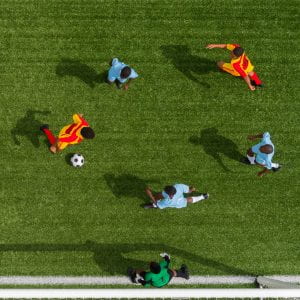 In the 2018 World Cup in Russia we have already been treated to a roller-coaster of excitement, euphoria, heart break and despair. From the outset, Russia brushed aside Saudi Arabia and set the tone for what should have been a predicable outcome in the early round of games – that Goliath will triumph over David time and again. But then France narrowly crept over the line against Australia followed by Argentina’s and Brazil’s inability to succeed against so called lesser nations(that said Switzerland are ranked 6th in the FIFA World Rankings). I, too, started to look at each fixture with more caution rather than to predict the obvious outcome when nations go head-to-head.
In the 2018 World Cup in Russia we have already been treated to a roller-coaster of excitement, euphoria, heart break and despair. From the outset, Russia brushed aside Saudi Arabia and set the tone for what should have been a predicable outcome in the early round of games – that Goliath will triumph over David time and again. But then France narrowly crept over the line against Australia followed by Argentina’s and Brazil’s inability to succeed against so called lesser nations(that said Switzerland are ranked 6th in the FIFA World Rankings). I, too, started to look at each fixture with more caution rather than to predict the obvious outcome when nations go head-to-head.
So what is it that is making these games more even than they ought to be? From a coaching perspective, I am always fascinated to witness how teams line up against each-other in an attempt to implement a rehearsed strategy in a bid to foil the opposition’s aims. Whether it was Iceland’s low, narrow block to deny Argentina’s Messi the time and space he needed to work his magic, Switzerland’s ultra-aggressive overload to thwart Neymar of Brazil or Mexico’s dynamic counter-attacking against a German defense, what is quite obvious so far is how the ‘smaller nations’ are playing tactically smart football. They are stifling some of the ‘power houses’ at this World Cup.
What this highlights, is an appreciation of how much preparation goes into the planning and rehearsal of the strategies on the training ground a match. The hours and hours of individual and collective analysis the managerial teams have to undertake in a bid to achieve a positive outcome from the forthcoming fixture.
Sometimes it is very difficult to appreciate the intricacies of each strategy from the lens of the TV camera however the BBC is providing viewers with the option to watch selected games from their tactical camera as part of their I-Player service. The tactical camera is a wide-angled camera which provides a broader and much clearer perspective of the whole pitch enabling viewers to see strategies live. This angle has afforded opportunities to assess my own coaching ability in determining tactics. It provides evidence of start positions of each unit, distances between these units, how the ball transitions around the pitch and offers greater insights into the team. I recommend the tactical camera to any aspiring coach who would like to gain experiences of assessing a match from a completely different, and in my opinion more beneficial, perspective.
With the first round of matches now at an end, what is now apparent is that the favourites cannot be complacent or take anything for granted at this World Cup. With the second round of games imminent and with footballing royalty Argentina, Brazil, Germany, Portugal and Spain under pressure to get results, I wonder what tactics their opponent’s will use in a bid to frustrate them and potentially send these ‘big hitters’ home early?
This blog was authored by Aaron Cusack, UEFA A Licence Football Coach and lectures the on BA (Hons) Football Coaching & Development degree at Plymouth Marjon University.